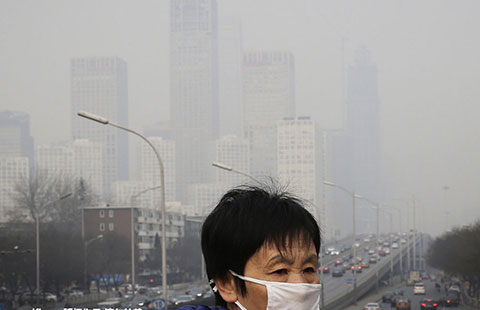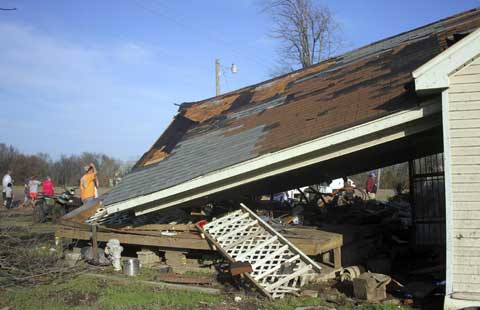

About 160 historical sites, including the Peking Man World Heritage Site at Zhoukoudian, were damaged in storms that lashed Beijing on Saturday. The direct economic losses reached 800 million yuan ($125 million), according to Beijing Municipal Administration of Cultural Heritage.
The deluge caused several small-scale landslides at the Peking Man site and disabled its security system, according to Li Yan, senior administrator at Zhoukoudian, located in a village 50 kilometers southwest of Beijing. A museum at the site was flooded, but the major exhibits are all safe.
Dirt and mud washed by the heaviest rainfall in six decades covered part of the archaeological dig at Zhoukoudian and halted researchers' work for at least three days, according to Zhang Shuangquan, an archaeologist at the Institute of Vertebrate Paleontology and Paleoanthropology of the Chinese Academy of Sciences.
Zhang said he was concerned most that a potential landslide caused by the downpour might destroy the whole dig site, which is on a cliff.
If the rock stratum were to collapse, it would lose its value for archaeology, because researchers learn how people lived in the past by taking account of the depth of objects and human remains embedded in the rock.
"A period of human civilization would be buried in mystery forever," said Zhang, who has been excavating the site since 2009.
Zhoukoudian's administrators covered the site with plastic sheets two years ago, but Zhang said the protection would be ineffective unless the whole mountain top were covered, because rain slowly permeates rocks, making the stratum fragile.
"The geological movement is very slow, but it might reach a breaking point at any moment, maybe tomorrow or 10 years from now," Zhang said. "I hope we can build the protection before the end of this summer."
Zhoukoudian has already contacted experts at Beijing's cultural heritage administration about drafting a protection plan, but there is no timeline for the project.
"We improved our fences and buildings in 2006, and thanks to that, we didn't have serious damage in this flood," Li said.
The security system is working again and the site is still open to the public, he said. Only a couple of sightseeing spots are closed because of safety concerns.
Every year, Zhoukoudian attracts more than 120,000 visitors and researchers from around the world, he said.
Discovered by the Swedish archaeologist Johan Gunnar Andersson in 1918, Zhoukoudian has yielded many archaeological breakthroughs, including one of the first specimens of Homo erectus, dubbed Peking Man. Several skulls were found at the site in 1920s and 1930s, but were lost in War of Resistance against Japanese Aggression.
In 1987, the United Nations Educational, Scientific and Cultural Organization named it a World Heritage Site.
"Any damage to Zhoukoudian will be a loss for China and the world," Li said.
The 1,400-year-old Yunju Temple, another historical site in Beijing's hard-hit Fangshan district, was also damaged by the deluge. Floodwaters washed down its walls and uprooted trees in the temple.
pengyining@chinadaily.com.cn













